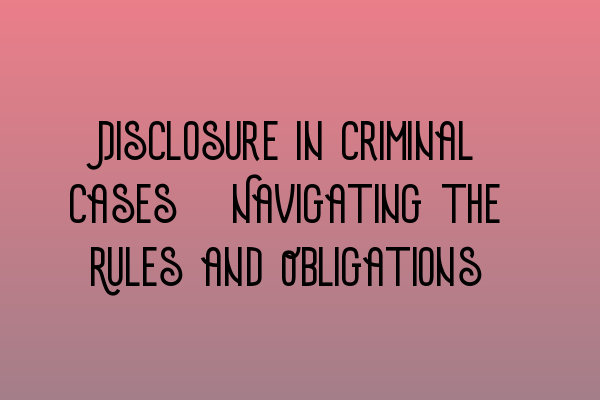Disclosure in Criminal Cases: Navigating the Rules and Obligations
In the realm of criminal law, disclosure is a crucial aspect of the legal process. It refers to the sharing of information between the prosecution and the defense in a criminal case. Proper disclosure ensures a fair trial and allows both sides to adequately prepare their arguments and evidence. To navigate the rules and obligations surrounding disclosure, it is essential to understand the fundamental principles and procedures involved.
The Importance of Disclosure
Disclosure plays a vital role in upholding the principles of justice. It promotes transparency, fairness, and allows the defense to make informed decisions about their case. Without proper disclosure, a defendant may be at a significant disadvantage, compromising the integrity of the criminal justice system.
Within the context of criminal proceedings, the prosecution has a legal duty to disclose all material that is capable of undermining their case or assisting the defense. This includes evidence that supports the defendant’s innocence, undermines the credibility of prosecution witnesses, or points towards an alternative suspect. Failure to disclose such material can have serious consequences and may even lead to a miscarriage of justice.
The Rules and Obligations
The rules and obligations regarding disclosure are governed by legislation, including the Criminal Procedure and Investigations Act 1996 (CPIA) and the Code of Practice for Crown Prosecutors. These laws outline the responsibilities of the prosecution and defense when it comes to disclosure.
It is crucial for both the prosecution and the defense to diligently comply with their obligations throughout the disclosure process. This involves conducting thorough investigations, identifying relevant material, and promptly disclosing it to the opposing party. The defense, too, has an obligation to disclose any unused material that may be of assistance to the prosecution.
Navigating the Disclosure Process
Effective navigation of the disclosure process requires careful attention to detail and a comprehensive understanding of the legal framework. Solicitors specializing in criminal law possess the expertise to guide their clients through this complex process. Working with a knowledgeable solicitor ensures that all relevant material is identified, assessed, and properly disclosed.
Furthermore, it is essential to stay up to date with any changes or updates in the laws surrounding disclosure. The Solicitors Qualifying Examination (SQE) prepares aspiring solicitors for various aspects of legal practice, including criminal law and practice. SQE preparation courses are designed to equip future solicitors with the necessary knowledge and skills to effectively handle disclosure requirements.
If you are preparing for the SQE exams, consider taking practice exams to assess your understanding of criminal law and practice. These SQE 1 Practice Exam Questions provide valuable insights into the type of questions you may encounter. Additionally, practicing with SQE 1 Practice Mocks FLK1 FLK2 gives you the opportunity to simulate exam-like conditions and evaluate your performance.
Exam Dates and Preparation Courses
For those aspiring to become solicitors, it is important to stay informed about the SRA SQE exam dates. Being aware of the exam schedule allows you to plan your study and preparation effectively.
To ensure you are fully prepared for the SQE exams, consider enrolling in SQE 1 and SQE 2 preparation courses. These courses provide comprehensive coverage of the relevant legal principles and practical skills required for successful exam performance. SQE 2 Preparation Courses focus specifically on criminal law and practice, equipping candidates with the specialized knowledge to handle aspects such as disclosure requirements.
In conclusion, proper disclosure is a fundamental aspect of criminal cases. It upholds the principles of justice and ensures a fair trial for all parties involved. Navigating the rules and obligations of disclosure requires expertise and a thorough understanding of the legal framework. Working with a seasoned solicitor and staying updated through SQE preparation courses significantly enhances your ability to handle disclosure requirements effectively.
For more information and resources on SQE exam preparation, please visit:
SQE 1 Practice Exam Questions,
SQE 1 Practice Mocks FLK1 FLK2,
SQE 2 Preparation Courses,
SQE 1 Preparation Courses,
SRA SQE Exam Dates.
